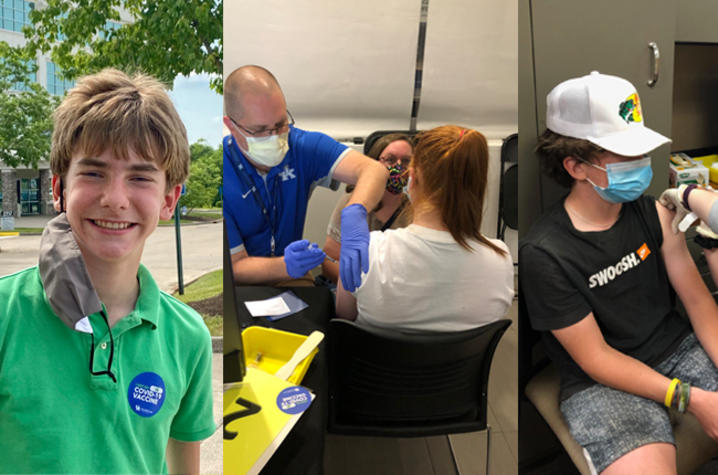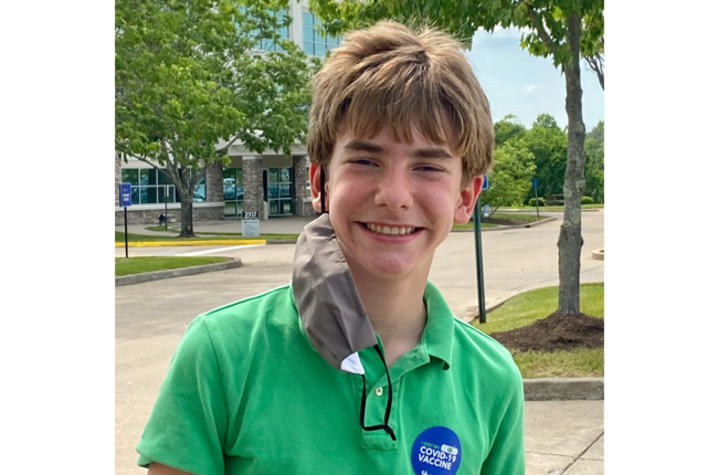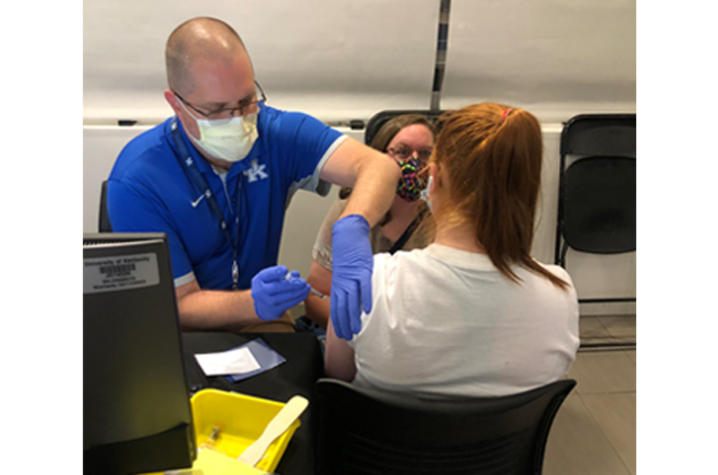UK Pediatric Providers on Why They Got Their Own Kids Vaccinated
LEXINGTON, Ky. (June 9, 2021) – There’s finally a light at the end of the long, dark pandemic tunnel. The vaccine rolled out across the country, starting with frontline healthcare workers, then the higher-risk populations, then to all adults. People everywhere lined up for the “shot of hope,” bringing the country closer to herd immunity.
But as more and more adults got vaccinated, the virus turned its attention to next most vulnerable population: children.
“An increasing proportion of COVID cases are being seen in children and adolescents,” said Dr. Sean McTigue, medical director for pediatric infection prevention and control at Kentucky Children’s Hospital (KCH). “Much of this is due to this population being largely unvaccinated.”
But the effects of the pandemic go beyond the viral disease. Children and teens grappled with abrupt cancellations of the school year, team sports, planned trips and even casual hangouts with friends. Dr. Erich Maul, division chief of hospital pediatrics at KCH, recalled how each of his four children struggled with the “new normal.”
“My youngest, Avery, struggled the most,” he said. “She is my social butterfly, and physical distancing was crushing her spirit.”
As the Food and Drug Administration approved the use of the vaccine in children 16 and up, Avery watched as her older siblings all got vaccinated, afraid she would have to wait years to go back to school and play with friends.
“I kept trying to keep her positive by saying ‘I know the data is out there, approval for kids under 18 can’t be far away,’” said Maul. “When I mentioned at the dinner table that Pfizer submitted the data for kids 12-15, it became a nightly question from a VERY excited 13-year-old lady. I have never seen Avery more excited or more calm about getting a shot! She sees this as a step to sleepovers, Girl Scout camp, vacation and seeing more family again.”
With everyone vaccinated, the Maul family has planned a busy summer with visits to extended family, road trips and team sports.
“While it is a challenge, they are making strides to be normal again,” said Maul. “It is very easy to get scared, it is really hard to get ‘un-scared.’ Getting the vaccine and trusting it is a great way to get un-scared.”
Jack Draus, the 13-year-son of Dr. John Draus, division chief of pediatric surgery at KCH, received his first dose and feels optimistic about what’s next.
“It has been difficult not being able to see my friends and family, and do the things that I usually do,” he said. “After getting the first dose of the vaccine, I feel that there is now light at the end of the tunnel, and I will be able to see my grandparents and new baby cousins soon.”
Since Jack’s 10-year-old brother is too young to be vaccinated, the Draus family is holding off on making summer plans. Until his brother’s age group is approved to get the vaccine, Jack is going to continue to wear his mask. He has some sage words for parents and kids who are hesitant about getting the shot.
“I know that it may seem scary, but only good can come out of getting the vaccine,” he said.
“Last week was truly an awesome week to have an opportunity to get our older two children vaccinated,” said Dr. Scottie B. Day, physician-in-chief at KCH. “My kids are not just doing this for them, but for their grandparents as well as the rest of the world. Immunity is a beautiful thing. If you look back at vaccine research that has existed for many years, it’s all done to be prepared for the ‘what-if’ scenario that happened this past year. I keep thinking about how different our lives would be right now if not for this research.”
Healthcare providers acknowledge that parents are on the fence about getting their children vaccinated. The vaccine is new, but it was built on decades of tested research and is safe and effective. Dr. Maul advises parents to talk to their kids and see how they feel about getting the vaccine.
“Talk to your pediatrician,” he said. “Do research using reputable websites such as the CDC and American Academy of Pediatrics. This is a public health decision and a human decision that transcends party politics."
As the state’s flagship, land-grant institution, the University of Kentucky exists to advance the Commonwealth. We do that by preparing the next generation of leaders — placing students at the heart of everything we do — and transforming the lives of Kentuckians through education, research and creative work, service and health care. We pride ourselves on being a catalyst for breakthroughs and a force for healing, a place where ingenuity unfolds. It's all made possible by our people — visionaries, disruptors and pioneers — who make up 200 academic programs, a $476.5 million research and development enterprise and a world-class medical center, all on one campus.








